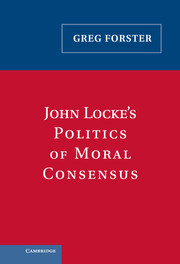Book contents
- Frontmatter
- Contents
- Acknowledgments
- List of Abbreviations
- John Locke's Politics of Moral Consensus
- 1 “Reason Teaches All Mankind, Who Will But Consult It”: John Locke and Moral Consensus
- 2 “Sit Down in Quiet Ignorance”: Locke's Epistemology of Limits
- 3 “The Candle of the Lord”: Locke's Rational Faith
- 4 “The Only Foundation of Faith”: Reasonable Christianity
- 5 “The Only True Touchstone of Moral Rectitude”: The Religious Foundations of Morality
- 6 “'Tis Reasonable to Think the Cause Is Natural”: Locke's Religious Eudemonism
- 7 “The Servants of One Sovereign Master”: Authority and Moral Consensus
- 8 “The Opinion of This or That Philosopher Was of No Authority”: Locke and Us
- Notes
- Bibliography
- Index
6 - “'Tis Reasonable to Think the Cause Is Natural”: Locke's Religious Eudemonism
Published online by Cambridge University Press: 17 August 2009
- Frontmatter
- Contents
- Acknowledgments
- List of Abbreviations
- John Locke's Politics of Moral Consensus
- 1 “Reason Teaches All Mankind, Who Will But Consult It”: John Locke and Moral Consensus
- 2 “Sit Down in Quiet Ignorance”: Locke's Epistemology of Limits
- 3 “The Candle of the Lord”: Locke's Rational Faith
- 4 “The Only Foundation of Faith”: Reasonable Christianity
- 5 “The Only True Touchstone of Moral Rectitude”: The Religious Foundations of Morality
- 6 “'Tis Reasonable to Think the Cause Is Natural”: Locke's Religious Eudemonism
- 7 “The Servants of One Sovereign Master”: Authority and Moral Consensus
- 8 “The Opinion of This or That Philosopher Was of No Authority”: Locke and Us
- Notes
- Bibliography
- Index
Summary
Locke faces a difficult challenge in constructing his political theory. He must build it on God's moral authority, because he believes that no other source of authority is both legitimate and sufficiently convincing for the needs of politics. As John Dunn puts it, for Locke the human race would “exist in a condition of total anomie” if not for God. However, the abuse of God's authority is the very problem that drew him into political theory in the first place. Politics based on religious enthusiasm, arbitrary scriptural interpretation, the pretensions of medieval scholastics to exclusive insights into nature, and claims on all sides of denominational supremacy had been the cause of recurring violence over the previous two centuries. The underlying reason for religious disagreement is that most of the available ways of learning about God are rife with epistemological landmines. Most religious truth is not laid out for us in such an obvious way that everyone can easily agree upon it. To build a religious moral theory that will unite rather than divide society, Locke must find a way of knowing God's law that is epistemologically simple and therefore equally clear to all.
Locke develops and implements a method for rationally investigating God's law by analyzing human nature, which is God's handiwork. Locke thinks that God's will is manifest in his construction of human nature, and that rational examination of human nature produces an understanding of God's will that is perfectly harmonious with that gained from rational examination of scripture.
- Type
- Chapter
- Information
- John Locke's Politics of Moral Consensus , pp. 194 - 217Publisher: Cambridge University PressPrint publication year: 2005



